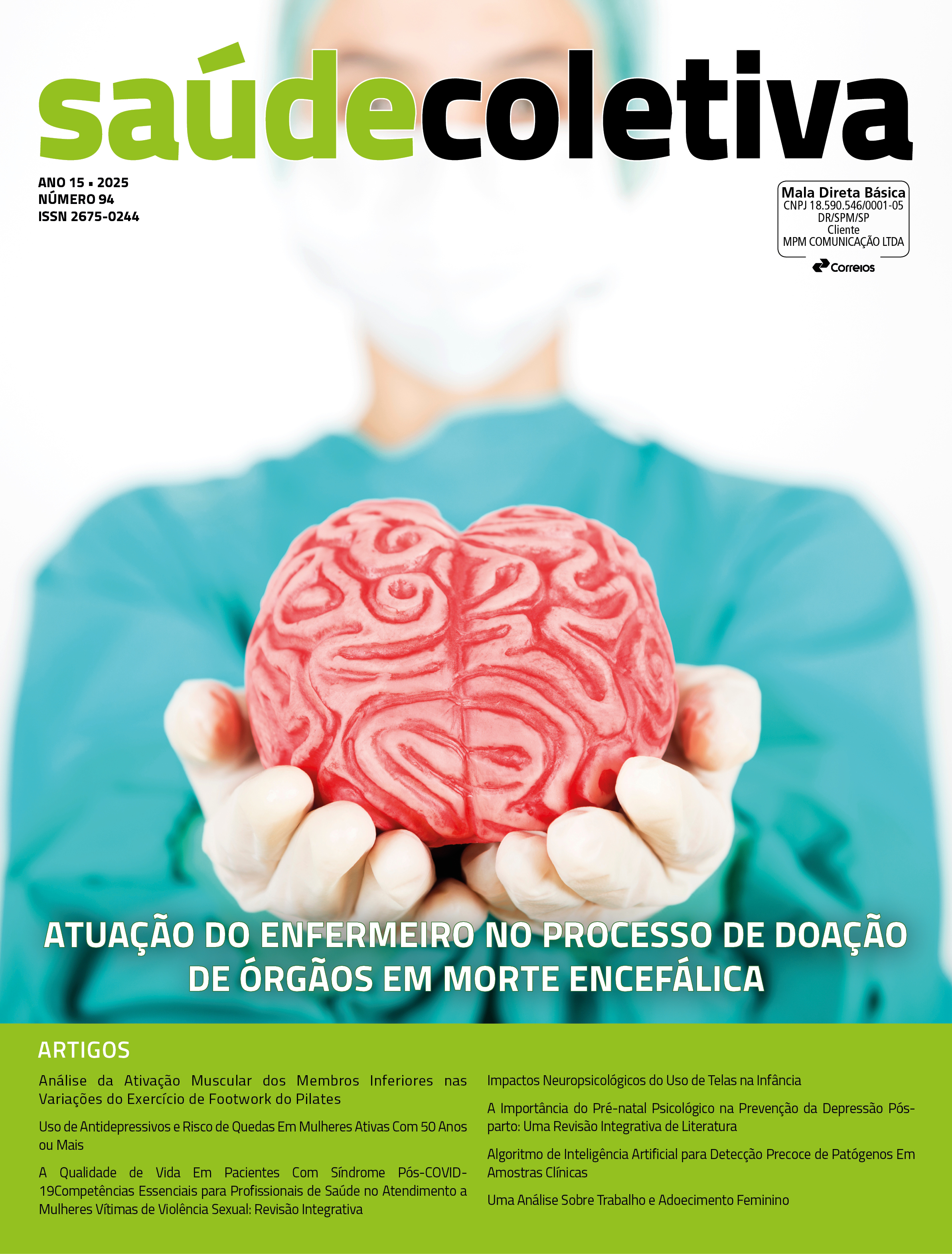Artificial Intelligence Algorithm for Early Detection of Pathogens in Clinical Samples
DOI:
https://doi.org/10.36489/saudecoletiva.2025v15i94p15283-15294Keywords:
Artificial Intelligence, AI Epidemiology, AI Clinical Analysis, AI DiagnosticsAbstract
The development of algorithmic automation for the early detection of pathogens represents a significant advance in health diagnostics. Traditional techniques, such as smear microscopy and biochemical assays, often suffer from lengthy processing times and limited sensitivity, necessitating faster and more accurate detection solutions. In addition to improving diagnostic capabilities, it supports timely treatment decisions in a scenario increasingly challenged by emerging infectious diseases. Its transformative role, particularly highlighted during the COVID-19 pandemic, has facilitated rapid diagnostic processes and improved clinical decision-making through data analysis. They have enabled the development of sophisticated algorithms capable of identifying pathogens with remarkable accuracy, as demonstrated by studies showing the effectiveness of models such as Gradient Boosting Machines (GBM) and K-Nearest Neighbors (KNN) in clinical settings. They help in antibiotic susceptibility testing, optimizing treatment strategies. Despite the promising potential, several notable challenges and controversies remain. Problems related to the quality and representativeness of data can lead to algorithmic biases, which can hinder the effectiveness of AI applications in various patient demographic groups. Regulatory frameworks are also evolving to address the complexities of AI in healthcare, with a focus on safety, efficacy and ethical considerations around patient data privacy and algorithm transparency.
References
ABDULKAREEM, M. The Promise of AI in Detection, Diagnosis, and Epidemiology for Combating COVID-19: Beyond the Hype. Front. Artif. Intell. 4:652669, 2021. doi: 10.3389/frai.2021.652669.
BADIDI, Elarbi. "Edge AI for Early Detection of Chronic Diseases and the Spread of Infectious Diseases: Opportunities, Challenges, and Future Directions" Future Internet 15, no. 11: 370, 2023. https://doi.org/10.3390/fi15110370.
DANKWA-MULLAN, I. Equidade em saúde e considerações éticas no uso da inteligência artificial em saúde pública e medicina. Prev Chronic Dis21:240245, 2024. DOI: http://dx.doi.org/10.5888/pcd21.240245.
FDA. How FDA Regulates Artificial Intelligence in Medical Products. As technology evolves, oversight will need to keep pace. Health Care Products. August 5, 2021.
HARRIS, Mohammed. "Machine Learning and Artificial Intelligence for Pathogen Identification and Antibiotic Resistance Detection: Advancing Diagnostics for Urinary Tract Infections" BioMed 3, no. 2: 246-255, 2023. https://doi.org/10.3390/biomed3020022.
HUANG T; ZHANG, R; LI, J. CRISPR-Cas-based techniques for pathogen detection: Retrospect, recent advances, and future perspectives. J Adv Res. Aug;50:69-82, 2023. doi: 10.1016/j.jare.2022.10.011. Epub Oct 30, 2022. PMID: 36367481; PMCID: PMC10403697.
JIA-WEI, T. et al. Rapid Discrimination of Clinically Important Pathogens Through Machine Learning Analysis of Surface Enhanced Raman Spectra. Front. Microbiol., 07 April 2022 Sec. Systems Microbiology. Volume 13, 2022. https://doi.org/10.3389/fmicb.2022.843417 .
LIU, Q., CHEN, Y., XIE, P. et al. Desenvolvimento de um modelo preditivo de aprendizado de máquina para perfis de patógenos em pacientes com imunodeficiência secundária. BMC Med Inform Decis Mak 24, 48, 2024. https:/doi.org/10.1186/s12911-024-02447-w.
MECKAWY, R., STUCKLER, D., MEHTA, A. et al. Eficácia dos sistemas de alerta precoce na detecção de surtos de doenças infecciosas: uma revisão sistemática. BMC Saúde Pública 22, 2216 (2022). https://doi.org/10.1186/s12889-022-14625-4.
MURDOCH, E. M. B. Privacidade e inteligência artificial: desafios para proteger a informação de saúde em uma nova era. BMC Med Ética 22, 122, 2021. https://doi.org/10.1186/s12910-021-00687-3.
NASEM, National Academies of Sciences, Engineering, and Medicine. Artificial Intelligence in Health Care: The Hope, the Hype, the Promise, the Peril. Washington, DC: The National Academies Press, 2022. https://doi.org/10.17226/27111.
SARANTOPOULOS, A. et al. "Artificial Intelligence in Infectious Disease Clinical Practice: An Overview of Gaps, Opportunities, and Limitations" Tropical Medicine and Infectious Disease 9, no. 10: 228, 2024. https://doi.org/10.3390/tropicalmed9100228.
SCHMIDT, J. et al. Mapeamento do panorama regulamentar da inteligência artificial em saúde na União Europeia. Baixar o jogo NPJ Digit Med. Ago 27;7(1):229, 2024. doi: 10.1038/s41746-024-01221-6. PMID: 39191937; PMCID: PMC11350181.
WILLIAMSON, S. M., PRYBUTOK, V. "Balancing Privacy and Progress: A Review of Privacy Challenges, Systemic Oversight, and Patient Perceptions in AI-Driven Healthcare" Applied Sciences 14, no. 2: 675, 2024. https://doi.org/10.3390/app14020675.
YUNQIU, Gao; MIN, Liu. Application of machine learning based genome sequence analysis in pathogen identification. Front. Microbiol., 01 October 2024, Sec. Systems Microbiology. V15 – 2024. https://doi.org/10.3389/fmicb.2024.1474078.







